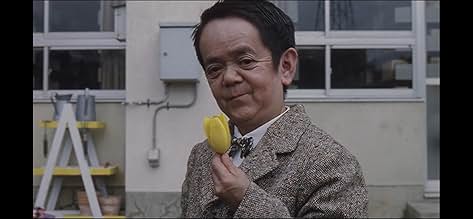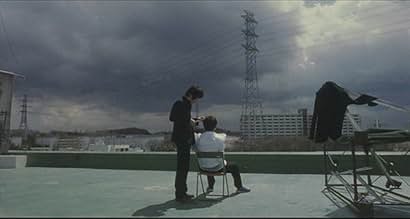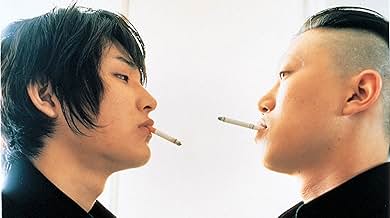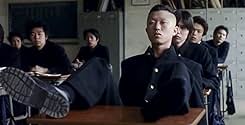Aoi haru
- 2001
- 1 घं 23 मि
IMDb रेटिंग
7.2/10
4.8 हज़ार
आपकी रेटिंग
अपनी भाषा में प्लॉट जोड़ेंA group of a run-down Tokyo high school students face the struggles of growing up, growing apart from their friends and worrying about their future, while living in a highly violent environm... सभी पढ़ेंA group of a run-down Tokyo high school students face the struggles of growing up, growing apart from their friends and worrying about their future, while living in a highly violent environment.A group of a run-down Tokyo high school students face the struggles of growing up, growing apart from their friends and worrying about their future, while living in a highly violent environment.
- निर्देशक
- लेखक
- स्टार
- पुरस्कार
- 1 जीत और कुल 2 नामांकन
Yûsuke Ôshiba
- Kimura
- (as Yûsuke Ohshiba)
Eita Nagayama
- Obake (Ghost)
- (as Eita)
फ़ीचर्ड समीक्षाएं
I think it captured the high school feeling of despair better than any other movie. The high school movies I am used to usually transform everything into a battle between characters where in the end the good guy wins. Or maybe he loses. But what if you don't want a battle? What if you just don't know what to do or you just don't care?
In Aoi Haru a deadly game decides who the leader of the school will be. A lonely quiet guy wins the game, but he does it only because he doesn't care enough to fear for his life. He actually does it for the game, not for the leadership. That annoys the hell out of his friend, ex boss himself, who can't understand someone that does not want to abuse his power. In the end their friendship is brutally ended.
There are some interesting metaphors in there, like the flowers that the boys are trying to grow, even if just one of them lives to see them blossom. It is also interesting that it is a boys only high school, maybe that's the norm in Japan, I don't know.
There is also in the movie the hidden message that neglect and inaction can do more damage than acting badly. I am talking here about the teachers in the film, that are just dictating machines with no will to educate or care. I mean, doctors can be accused of malpraxis. Lawyers, too. Yet teachers, who are supposed to create social beings from adolescents, are not held responsible for their mistakes.
Enough babble. This is a good film, maybe a bit long, but it does need almost every scene. The soundtrack is also very nice and fits the plot. It is worth watching.
In Aoi Haru a deadly game decides who the leader of the school will be. A lonely quiet guy wins the game, but he does it only because he doesn't care enough to fear for his life. He actually does it for the game, not for the leadership. That annoys the hell out of his friend, ex boss himself, who can't understand someone that does not want to abuse his power. In the end their friendship is brutally ended.
There are some interesting metaphors in there, like the flowers that the boys are trying to grow, even if just one of them lives to see them blossom. It is also interesting that it is a boys only high school, maybe that's the norm in Japan, I don't know.
There is also in the movie the hidden message that neglect and inaction can do more damage than acting badly. I am talking here about the teachers in the film, that are just dictating machines with no will to educate or care. I mean, doctors can be accused of malpraxis. Lawyers, too. Yet teachers, who are supposed to create social beings from adolescents, are not held responsible for their mistakes.
Enough babble. This is a good film, maybe a bit long, but it does need almost every scene. The soundtrack is also very nice and fits the plot. It is worth watching.
I watched this film for the first time a few nights ago, and it was still in my mind as i took my hour's long morning walk to work.it was still not enough time to properly reflect on what i'd just watched. it really touched me deep, it effected me as much as Battle Royale. even though i couldn't get subtitles on my computer the story was easy to pick up and i didn't realise i wasn't reading them. if i could strongly recommend any film other than 'Battle Royale', 'All about Lily Chou-Chou' and 'moonlight jellyfish', it would most definitely be this one.its quite a powerful film. there's more to the story than just whats on the surface and we get to see some of our most lovable Japanese actors play totally new roles. one of which is the lovely 'Sosuke Takaoka' who plays the slightly psychotic 'Yukio', who gives 'Kazuo Kiriyama' a run for his psycho-status.even though he goes out too early he is the one who sticks strongly in my mind,he can change such a simple little tune into one that is quite haunting.all the characters add something special to the film.in my opinion its too short.i love long films and would have liked to get to know a little more of each character,especially 'Yoshimura' ('Shugo Oshinari') 'Yukio' ('Sosuke Takaoka') and 'Takashi Tsukamoto's' character.the violence is strong but none the less kept realistic and believable right up until the breath-holding end,which kind of pulls on the heart-strings but doesn't disappoint in the quality of the ending, only for the fact that we're left with feeling of sadness for 'Aoki', one of the main characters.this film ends in totally the right way to be true to the film.this film was done with pure excellence and is capable of showing beauty through the darkest of violence.many people forget what its like for young kids growing up and the situations, challenges and decisions they have to face. this film can really bring you back down with a truthful slam to the ground.this is one story that will stay firmly set in my mind for a very long time and one that should be acknowledged,all the actors really pull of this film with the highest quality.other than the above mentioned Japanese films, you really will be hard pushed to find such a powerful film to beat this one,you will not be disappointed, guaranteed. Lisa Sawyer(21)
The closing night movie for the SF Indie Fest is a vaguely coming of age type drama, set entirely within the grounds of a Japanese boy's school. Here, the kids all run around in gangs, sleep in lectures and fight at break times. Every wall in the place is covered in graffiti. Ryuhei Matsuda (the effeminate guy from GOHATTO) stars as Kuja, a senior who becomes the school's official gang leader by winning at "The Clapping Game". This game involves the kids hanging from a railing on the edge of the school roof, letting go and seeing how many times they can clap their hands before their nerve fails and they grab back on.
From here we follow the progress of his friends and enemies throughout a part of the school year, the challenges to his leadership and the pressure of the school system felt by everyone. There's a hell of a lot of violence goes on in the school, and we get the impression that life as a Japanese school boy is a difficult dangerous business.
It's a pretty bleak and cheerless vision - between this and BATTLE ROYALE you'd be forgiven for thinking that the Japanese school system was on the point of explosion or collapse, with the youth as disaffected as they come. How close this is to reality I don't know, but the friend I saw it with tells me that the classroom scenes are pretty close to how it actually is.
The cast all perform well - Ryuhei Matsuda has such a striking appearance that he doesn't really need to do anything to create an impression, and indeed he spends most of the movie being aloof and impenetrable. This contrasts with the energies and frustrations evident in the other characters, particulary his best friend Aoki.
I enjoyed the movie a lot... good characters, and well filmed/scored, with interesting developments. It's based on a collection of autobiographical short stories from a manga artist, which shows a little bit in the episodic nature of the plot, but it's all weaved together well for the movie. Worth looking out for if you don't mind your high school movies nihilistic, violent and bleak.
From here we follow the progress of his friends and enemies throughout a part of the school year, the challenges to his leadership and the pressure of the school system felt by everyone. There's a hell of a lot of violence goes on in the school, and we get the impression that life as a Japanese school boy is a difficult dangerous business.
It's a pretty bleak and cheerless vision - between this and BATTLE ROYALE you'd be forgiven for thinking that the Japanese school system was on the point of explosion or collapse, with the youth as disaffected as they come. How close this is to reality I don't know, but the friend I saw it with tells me that the classroom scenes are pretty close to how it actually is.
The cast all perform well - Ryuhei Matsuda has such a striking appearance that he doesn't really need to do anything to create an impression, and indeed he spends most of the movie being aloof and impenetrable. This contrasts with the energies and frustrations evident in the other characters, particulary his best friend Aoki.
I enjoyed the movie a lot... good characters, and well filmed/scored, with interesting developments. It's based on a collection of autobiographical short stories from a manga artist, which shows a little bit in the episodic nature of the plot, but it's all weaved together well for the movie. Worth looking out for if you don't mind your high school movies nihilistic, violent and bleak.
'Aoi Haru' is a very bleak movie that derives its beauty precisely from the haunting sense of nihilism. The almost ruined school with its dingy rooms and dense graffiti is not just the set to the action, it seems to represent the characters' lack of prospects. A movie that makes something of a pun on the word 'adolescence' (together the kanji for 'ao' and 'haru' read as 'adolescence') cannot help but make considerations about the future but these are without a doubt not promising. The school-ground is a yakuza recruiting ground in the most literal of ways and the initiation into gangs is not so much a temporary revolt from troubled teens as it is a preparation for a life of crime. Dreams are hinted at only to be thoroughly dashed. Violence runs rampant but is handled soberly by a camera that know just how much to show to elicit a reaction.
It is against this background that the main story unfolds: a friendship between two boys gone wrong. Matsuda (Kujo) gives a stunning performance, his cool demeanor matches sociopathic tendencies very well and make him believable as a ruthless and detached young man with little interest even in his own life. The clapping game will have anyone hold their breath and is shot in such a way as to make it even more disturbing. Arai (Hirofumi) is also very competent as the bosom body whose fall out seals his descent into darkness.
A strong soundtrack adds to the impression of things going wrong in an artistic way. Juvenile delinquents or not the human aspect of boys in a sticky situation provides reasons for the viewer to see past the almost intrinsic seediness of it all. Ryuhei cutting Araki's hair as they discuss what to do when they grow up is surprisingly moving and the climax of the movie brings it all home in a painful but excellent way. Apart from these two leads there are minor characters that are equally interesting such as the sickly boy fascinated with worms (that despite being so peaceful frightens Kujo because he has a purpose), a psychopath in the making, the boy that wants to go to Koshien. All people that are adrift without guidelines.
Grownups are not absent but they appear sparingly and only the little person teacher that teaches the boys how to water flowers is a positive influence. The focus is strongly placed on the young actors and they truly do shine.
'Aoi Haru' is realistic despite being a very artistic movie. It should be seen back to back to Miike's 'Crows Zero' that is a take of the same concept in a much more fanciful and less bleak way. But 'Aoi' is brilliant in its own right by adhering so steadily to an ethos of bleakness and loss. Growing is, without a doubt, not easy.
It is against this background that the main story unfolds: a friendship between two boys gone wrong. Matsuda (Kujo) gives a stunning performance, his cool demeanor matches sociopathic tendencies very well and make him believable as a ruthless and detached young man with little interest even in his own life. The clapping game will have anyone hold their breath and is shot in such a way as to make it even more disturbing. Arai (Hirofumi) is also very competent as the bosom body whose fall out seals his descent into darkness.
A strong soundtrack adds to the impression of things going wrong in an artistic way. Juvenile delinquents or not the human aspect of boys in a sticky situation provides reasons for the viewer to see past the almost intrinsic seediness of it all. Ryuhei cutting Araki's hair as they discuss what to do when they grow up is surprisingly moving and the climax of the movie brings it all home in a painful but excellent way. Apart from these two leads there are minor characters that are equally interesting such as the sickly boy fascinated with worms (that despite being so peaceful frightens Kujo because he has a purpose), a psychopath in the making, the boy that wants to go to Koshien. All people that are adrift without guidelines.
Grownups are not absent but they appear sparingly and only the little person teacher that teaches the boys how to water flowers is a positive influence. The focus is strongly placed on the young actors and they truly do shine.
'Aoi Haru' is realistic despite being a very artistic movie. It should be seen back to back to Miike's 'Crows Zero' that is a take of the same concept in a much more fanciful and less bleak way. But 'Aoi' is brilliant in its own right by adhering so steadily to an ethos of bleakness and loss. Growing is, without a doubt, not easy.
If one pays scant attention to the news in Japan, seen Iwai Shunji's _All About Lily Chou Chou_, or read short stories and novels by Murakami Ryu, one knows that Japan, like other countries, suffers from an escalation of violence in schools. This violence works in three ways: student vs. teacher, teacher vs. student, and, the most common, student vs. student. Although it is still rare, the newspapers and news programs are peppered with stories of bullies beating someone to death or the bullied killing his bullies. Murakami Ryu and Yu Miri have both focused on these subjects in their literary works. Toyoda Toshiaki, through his film _Blue Spring_ also touches on this controversial subject.
The kids attending the all boys Asahi High School would basically be considered the dregs of Japanese society. The school is rundown and the teachers teach such a drypan, apathetic manner that it is not surprising that the kids could care less. The only teacher who seems to actually care about any of his students is a dwarf who waters the flowers on the school grounds all day.
However, although the teaching might be unstructured, there is a rigid code of hierarchy enforced by the tough kids. A leader is chosen by a suicidal ritual in which a student claps his hands as many times as possible while falling backwards. After he claps a certain amount of times, he grabs the guardrail. Miss the guardrail, instant pancake.
At the beginning of this film, after the "graduation" of the senior class, Kujo, played by the extraordinarily handsome Matsuda Ryuhei, wins the contest. Kujo is a bit indifferent to his new found power, but goes along with it because he has the support of his friends: Aoki, Yukio, Yoshimura, and Kimura.
Although many of the students are not satisfied with the way their lives are shaping, they seem to basically concede that good jobs and college are not in their future and that they are either on the track to become either a menial laborer or a member of the Yakuza.
_Blue Spring_ is an interesting film that depicts individuals who are not on the "normal road of becoming a good Japanese citizen": i.e. Graduation, work, stable family. It shows the dregs, but the dregs also show that social hierarchy exists from the lowest to the highest.
I think that the film is quite well done. The filming is dark, but it fits the atmosphere of the film. The soundtrack is excellent.
The kids attending the all boys Asahi High School would basically be considered the dregs of Japanese society. The school is rundown and the teachers teach such a drypan, apathetic manner that it is not surprising that the kids could care less. The only teacher who seems to actually care about any of his students is a dwarf who waters the flowers on the school grounds all day.
However, although the teaching might be unstructured, there is a rigid code of hierarchy enforced by the tough kids. A leader is chosen by a suicidal ritual in which a student claps his hands as many times as possible while falling backwards. After he claps a certain amount of times, he grabs the guardrail. Miss the guardrail, instant pancake.
At the beginning of this film, after the "graduation" of the senior class, Kujo, played by the extraordinarily handsome Matsuda Ryuhei, wins the contest. Kujo is a bit indifferent to his new found power, but goes along with it because he has the support of his friends: Aoki, Yukio, Yoshimura, and Kimura.
Although many of the students are not satisfied with the way their lives are shaping, they seem to basically concede that good jobs and college are not in their future and that they are either on the track to become either a menial laborer or a member of the Yakuza.
_Blue Spring_ is an interesting film that depicts individuals who are not on the "normal road of becoming a good Japanese citizen": i.e. Graduation, work, stable family. It shows the dregs, but the dregs also show that social hierarchy exists from the lowest to the highest.
I think that the film is quite well done. The filming is dark, but it fits the atmosphere of the film. The soundtrack is excellent.
क्या आपको पता है
- ट्रिवियाIn the scene where Kimura gives his blazer to the baseball club freshman before climbing over the fence to join the Yakuza, there is Japanese writing embroidered on the jacket lining. This is the same poem that Kimura reads out in voiceover during the subsequent shots of him getting in the car.
- कनेक्शनVersion of Revolver - Aoi haru (2003)
- साउंडट्रैकDrop
Performed by Thee Michelle Gun Elephant
टॉप पसंद
रेटिंग देने के लिए साइन-इन करें और वैयक्तिकृत सुझावों के लिए वॉचलिस्ट करें
- How long is Blue Spring?Alexa द्वारा संचालित
विवरण
बॉक्स ऑफ़िस
- बजट
- $8,00,000(अनुमानित)
- चलने की अवधि1 घंटा 23 मिनट
- रंग
- पक्ष अनुपात
- 1.85 : 1
इस पेज में योगदान दें
किसी बदलाव का सुझाव दें या अनुपलब्ध कॉन्टेंट जोड़ें























